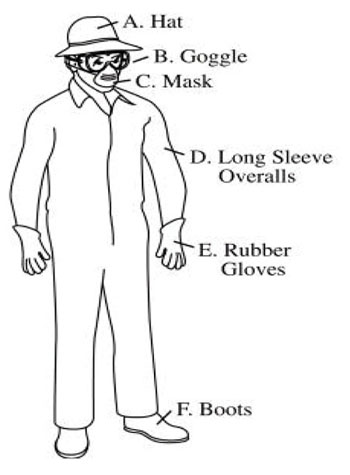10.13 Safe handling of insecticides
All insecticides are poisonous and must be handled with care. The following precautions are recommended and should always be practiced:
- Anyone handling insecticides should be informed of the risks involved in their use, and should receive instructions for handling them safely.
- You should adequately supervise spray operators to ensure they are following instructions.
- The spray operator must wear a hat and clothing that covers as much of the body as possible, including arms and legs; the nose and mouth should be covered with a disposable or washable mask (Figure 10.5).

- Hands and faces should be washed with soap and water after spraying and before eating, smoking or drinking.
- Insecticide spray should not fall onto arms, legs or other parts of the body. If the insecticide gets on to skin, it should be washed off immediately with soap and water.
- Leaky spray equipment should be repaired.
- Operators should bathe at the end of every day’s work and change into clean clothes
- Clothes should be changed immediately if they become contaminated with insecticides.
- Operators should inform you immediately if they do not feel well.
- At the end of the day's work, washings from the sprayer should be put into pit latrines, if available, or into pits dug especially for this purpose and away from sources of drinking water.
- Any leftover insecticide must not be poured into rivers, pools or drinking water sources.
- Empty insecticide containers should not be re-used.
10.12 The role of the health post, health centre and District Health Office in IRS operations
